Fault Code 637: Rail D Aft Solenoid (B3)
J1939: SA 3 SPN 4216 FMI 0, 1, 3, 4, 5, 6, 7, 8, 12, 14, 15, 16, 17, 18, 31
Overview
The Mechatronic Transmission Module (MTM) is equipped with solenoids to direct pneumatic flow. The Rail D Aft Solenoid (RDAS) is energized by the Transmission Control Module (TCM) to direct vehicle supplied air pressure to actuate the Rail D Sliding Clutch in the aft or rearward direction. The RDAS is located in the MTM and connected to the TCM at the 74-Way Transmission Harness Connector.
Detection
The TCM monitors the RDAS. If a system failure is detected, the fault is set Active.
Conditions to Set Fault Code Active
FMI 0 – Data Valid But Above Normal (Most Severe): RDAS low side current is greater than commanded current.
FMI 1 – Data Valid But Below Normal (Most Severe): RDAS low side current is less than commanded current.
FMI 3 – Voltage Above Normal or Shorted High: RDAS shorted to power for 2 seconds.
FMI 4 – Voltage Below Normal or Shorted Low: RDAS shorted to ground for 2 seconds.
FMI 5 – Current Below Normal or Open Circuit: RDAS open circuit for 2 seconds.
FMI 6 – Current Above Normal or Shorted Circuit: RDAS commanded on and shorted to ground.
FMI 7 – Mechanical System Not Responding: One time during an ignition cycle, Rail D Position Sensor reported uncommanded movement aft, out of the Primary Driven Gear, and speed sensors con-firmed the loss of Primary Driven Gear engagement.
FMI 8 – Abnormal Frequency: RDAS out of normal operating frequency.
FMI 12 – Bad Intelligent Device: RDAS commanded on beyond expected duty cycle.
FMI 14 – Special Instructions: Rail D Position Sensor reported uncommanded movement from Neutral toward the Reverse Gear immediately after a shift to Neutral for 2 seconds.
FMI 15 – Data Valid but Above Normal (Least Severe): Rail D Position Sensor reported uncommanded movement from Neutral toward the Reverse Gear for 2 seconds.
FMI 16 – Data Valid but Above Normal (Moderately Severe): RDAS commanded on for longer than expected increasing solenoid temperature.
FMI 17 – Data Valid but Below Normal (Least Severe): Rail D Position Sensor reported uncommanded movement aft, out of the Primary Driven Gear, and speed sensors confirmed the loss of Primary Driven Gear engagement.
FMI 18 – Data Valid but Below Normal (Moderately Severe): RDAS commanded on below expected voltage.
FMI 31 – Condition Exists: During a Rail Calibration, Rail D Position Sensor reported uncommanded movement aft, out of neutral toward the Reverse Gear.
Fallback
FMI 0, 1, 5, 6, 8, 12, 16, 18:
- Amber warning lamp on
- If vehicle is stationary and Rail D is not engaged in the Secondary Driven Gear
- Rail D movement in the aft direction prohibited
- If vehicle is moving and Rail D is engaged in the Secondary Driven Gear
- Rail D movement prohibited
- If vehicle is moving and no start gear available
- Red stop lamp on
FMI 3, 4:
- Amber warning lamp on
- Rail D movement in the aft direction prohibited
FMI 7:
- No degraded modes
FMI 14, 15:
- Amber warning lamp on
- Non neutral modes prohibited
- PTO mode prohibited
- If the vehicle is moving and the transmission is in gear
- Red stop lamp on
- Transmission shifts to neutral when vehicle comes to a stop
FMI 17:
- Amber warning lamp on
- Rail D engagement of the Primary Driven Gear prohibited
FMI 31:
- Amber warning lamp on
- Non neutral modes prohibited
Conditions to Set Fault Code Inactive
FMI 0, 1, 6, 7, 8, 12, 14, 15, 16, 17, 18, 31: Key cycle
FMI 3, 4, 5: RDAS in range for 10 seconds
Possible Causes
FMI 0, 1, 3, 4, 5, 6, 8, 16, 18:
- MTM - RDAS
- Internal failure
- Damaged
- MTM - Transmission Harness
- Wiring shorted to power, shorted to ground or open
- TCM
- Internal failure
FMI 7, 17:
- MTM - RDAS
- Partially stuck open
- Internal transmission
- Primary Driven Gear
- Rail D Sliding Clutch
FMI 12:
- TCM
- Software issue
- Internal failure
FMI 14, 15:
- MTM - RDAS
- Partially stuck open
- MTM - Rail D Position Sensor
- Internal failure
FMI 31:
- MTM - RDAS
- Partially stuck open
Additional Tools
- Endurant HD Service Manual TRSM0950
- Eaton Breakout Box with 74-Way Eaton Diagnostic Adapter - RR1029TR
- Digital Volt/Ohm Meter (DVOM)
Component Identification
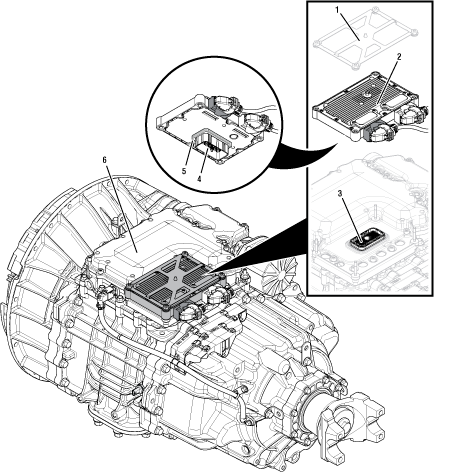 |
1. Transmission Control Module (TCM) Cover 2. Transmission Control Module (TCM) 3. 74-Way Transmission Harness Connector (MTM-side) 4. 74-Way Transmission Harness Connector (TCM-side) 5. Transmission Control Module (TCM) Seal 6. Mechatronic Transmission Module (MTM) |
Fault Code 637 Troubleshooting
Set vehicle parking brake and chock wheels.
Record the transmission fault codes, FMIs, occurrences, and timestamps from the Service Activity Report created during the Diagnostic Procedure.
If Fault Code 637 FMI 0, 1, 3, 4, 5, 6, 8, 16, 18 is Active or Inactive, Go to Step B
If Fault Code 637 FMI 12 is Active or Inactive, Contact Eaton Cummins Automated Transmission Technologies for further diagnostic instructions. For Help Line phone numbers, go to Contact Information. Go to Step V
If Fault Code 637 FMI 7, 14, 15, 31 is Active or Inactive, go to TAIB-1006 MTM Solenoid Fault Codes and Vehicle Air System Contamination.
If Fault Code 637 FMI 17 is Active or Inactive, contact Eaton Cummins Automated Transmission Technologies for further diagnostic instructions. For Help Line phone numbers, go to Contact Information. Go to Step V
NOTICE: Refer to Vehicle Maintenance Recommendations regarding vehicle air system requirements to ensure proper air supply and air quality.
Key off.
Remove the TCM from the MTM with the 20-Way TCM Vehicle Harness Connector and 20-Way TCM Body Harness Connector connected.

Inspect the TCM side of the 74-Way Transmission Harness Connector, verify the connector is free from contamination and corrosion; the terminals are not bent, spread or loose; and there is no damage to the connector body.
Inspect the TCM Seal, verify the seal is properly installed and not damaged.
If contamination or damage is found to the TCM side of the 74-Way Transmission Harness Connector, replace the Transmission Control Module (TCM) and Mechatronic Transmission Module (MTM). Go to Step V
Note: MTM removal and installation requires the transmission to be removed from the vehicle. Reference Endurant HD Service Manual TRSM0950, Transmission Removal Service Procedure.
If no contamination or damage is found, Go to Step C
Key on with engine off.
Connect ServiceRanger.
Go To “Configuration”.
Select “Advanced”.
Note: If “Advanced” is not indicated, TCM software is unable to determine MTM Type. Go to Step 6.
Record “MTM Type” Current Value, go to Step 7.
Locate MTM part information tag and record MTM Part Number (Item 1) in table.
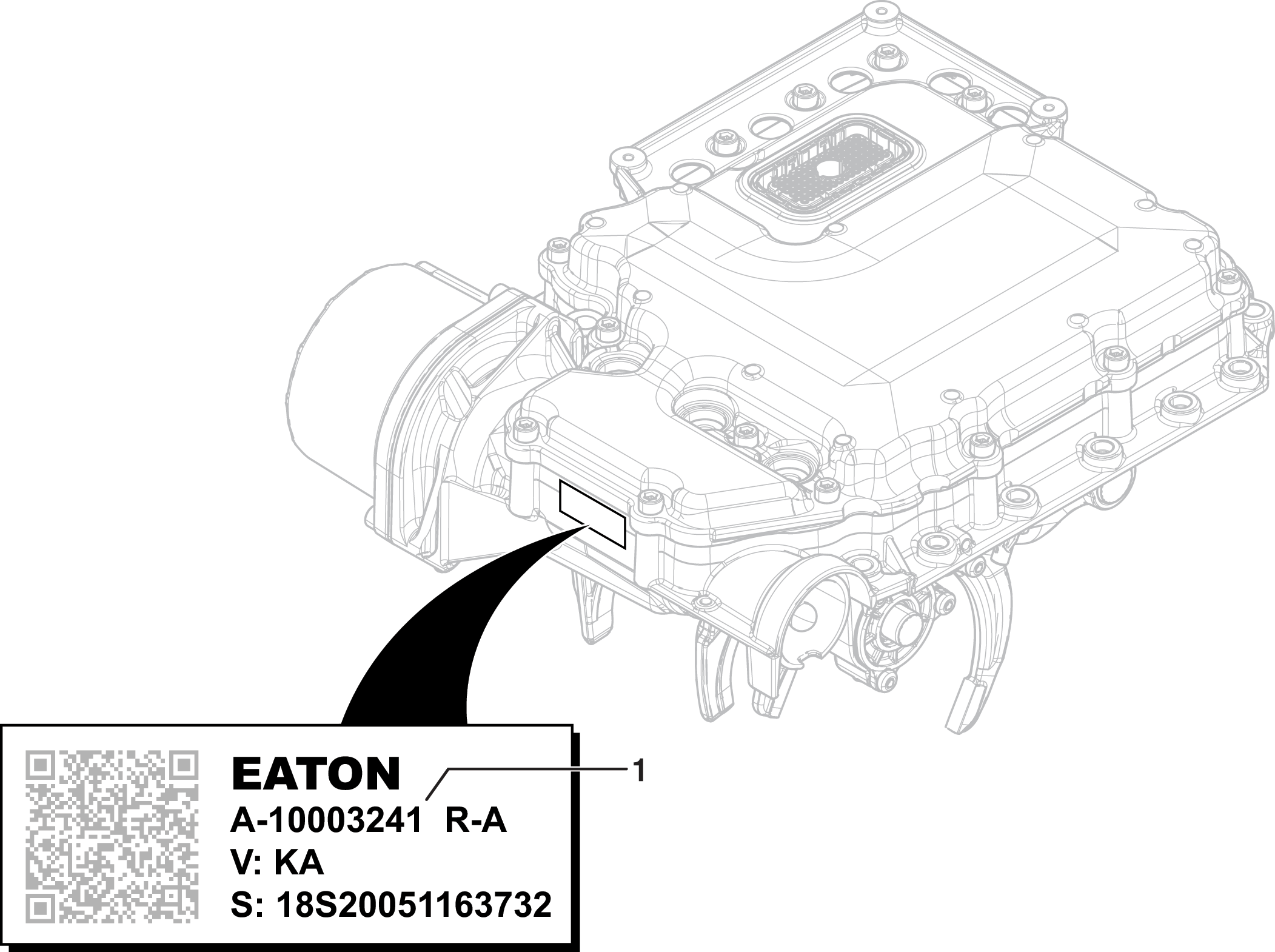
Compare MTM Part Number recorded in Step 6 with MTM Part Number in table to determine MTM Type.
If MTM Type is PS-393, Go to Step D
If MTM Type is PS-496, Go to Step E
| MTM Part Number on tag | |
|---|---|
| MTM Part Number | MTM Type |
| A-10000715 | PS-393 |
| A-10002594 | |
| A-10004202 | |
| A-10004231 | PS-496 |
| A-10004356 | |
| A-10004383 | |
Key off.
Connect the Eaton Breakout Box with 74-Way Eaton Diagnostic Adapter to the MTM side of the 74-Way Transmission Harness Connector.
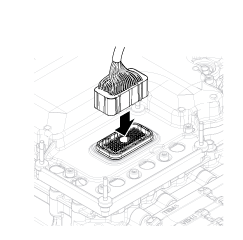
Measure resistance at the Eaton Breakout Box between Pin 5 and Pin 20. Record reading in table.

Measure resistance at the Eaton Breakout Box between Pin 5 and Ground (TCM mounting stud). Record reading in table.

Compare reading(s) in table.
If readings are in range, Go to Step F
If readings are out of range, replace the Mechatronic Transmission Module (MTM). Go to Step V
Note: MTM removal and installation requires the transmission to be removed from the vehicle. Reference Endurant HD Service Manual TRSM0950, Transmission Removal Service Procedure.
| Pins | Range | Reading(s) |
|---|---|---|
| 5 to 20 | 3.6–4.4 Ohms | |
| 5 to ground (TCM mounting stud) | Open Circuit (OL) |
Key off.
Connect the Eaton Breakout Box with 74-Way Eaton Diagnostic Adapter to the MTM side of the 74-Way Transmission Harness Connector.

Measure resistance at the Eaton Breakout Box between Pin 1 and Pin 2. Record reading in table.

Measure resistance at the Eaton Breakout Box between Pin 1 and Ground (TCM mounting stud). Record reading in table.
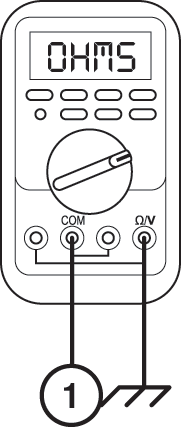
Compare reading(s) in table.
If readings are in range, Go to Step F
If readings are out of range, replace the Mechatronic Transmission Module (MTM). Go to Step V
Note: MTM removal and installation requires the transmission to be removed from the vehicle. Reference Endurant HD Service Manual TRSM0950, Transmission Removal Service Procedure.
| Pins | Range | Reading(s) |
|---|---|---|
| 1 to 2 | 3.4–5.5 Ohms | |
| 1 to ground (TCM mounting stud) | Open Circuit (OL) |
Key off.
Remove the 74-Way Eaton Diagnostic Adapter.
Reinstall the TCM to the MTM.
Reconnect all connectors and verify that all components are properly installed.
Key on.
Connect ServiceRanger.
Retrieve and record the transmission fault codes, FMIs, occurrences, and timestamps.
If Fault Code 637 FMI 0, 1, 3, 4, 5, 6, 8, 16, 18, 31 is Active, replace the Transmission Control Module (TCM). Go to Step V
If Fault Code 637 FMI 0, 1, 3, 4, 5, 6, 8, 16, 18, 31 is Inactive, replace the Mechatronic Transmission Module (MTM). Go to Step V
Note: MTM removal and installation requires the transmission to be removed from the vehicle. Reference Endurant HD Service Manual TRSM0950, Transmission Removal Service Procedure.
Key off.
Remove the MTM.
Note: MTM removal and installation requires the transmission to be removed from the vehicle. Reference Endurant HD Service Manual TRSM0950, Transmission Removal Service Procedure.
Inspect the Primary Driven Gear for excessive fore and aft movement.
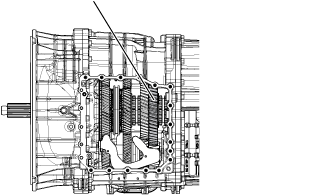
If excessive gear movement is evident, inspect the Main Shaft Assembly and Primary Driven Gear and repair. Go to Step V
If no excessive gear movement is evident, Go to Step H
Inspect the Rail D Sliding Clutch yoke slot for wear.
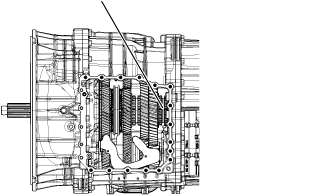
Shift the Rail D Sliding Clutch to the neutral position (if necessary).
Shift the Rail D Sliding Clutch into the Primary Driven Gear engagement position (fore).
Inspect the Rail D Sliding Clutch clutching teeth for wear.
Return the Rail D Sliding Clutch to neutral.
Shift the Rail D Sliding Clutch into the Reverse Gear engagement position (aft).
Inspect the Rail D Sliding Clutch clutching teeth for wear.
Return the Rail D Sliding Clutch to neutral.
If the Rail D Sliding Clutch shifts into all three positions and no clutching teeth wear is present, replace the Mechatronic Transmission Module (MTM). Go to Step V
If the Rail D Sliding Clutch does not shift into all three positions and/or clutching teeth wear is present, reference Main Shaft Disassembly/Assembly Procedure for replacement of the following components and Go to Step V
- Primary Driven Gear
- Rail D Sliding Clutch
Note: Inspect Reverse Gear clutching teeth for wear, if worn replace gear.
Key off.
Reconnect all connectors and verify that all components are properly installed.
Key on with engine off.
Connect ServiceRanger.
Go to “Fault Codes”.
Select “Clear All Faults”.
Operate vehicle and attempt to reset the fault code or duplicate the previous complaint.
Check for fault codes using ServiceRanger.
If no fault codes set and the vehicle operates properly, test complete.
If Fault Code 637 sets Active during operation, Go to Step A
If a fault code other than 637 sets Active, troubleshoot per the Fault Code Isolation Procedure Index.